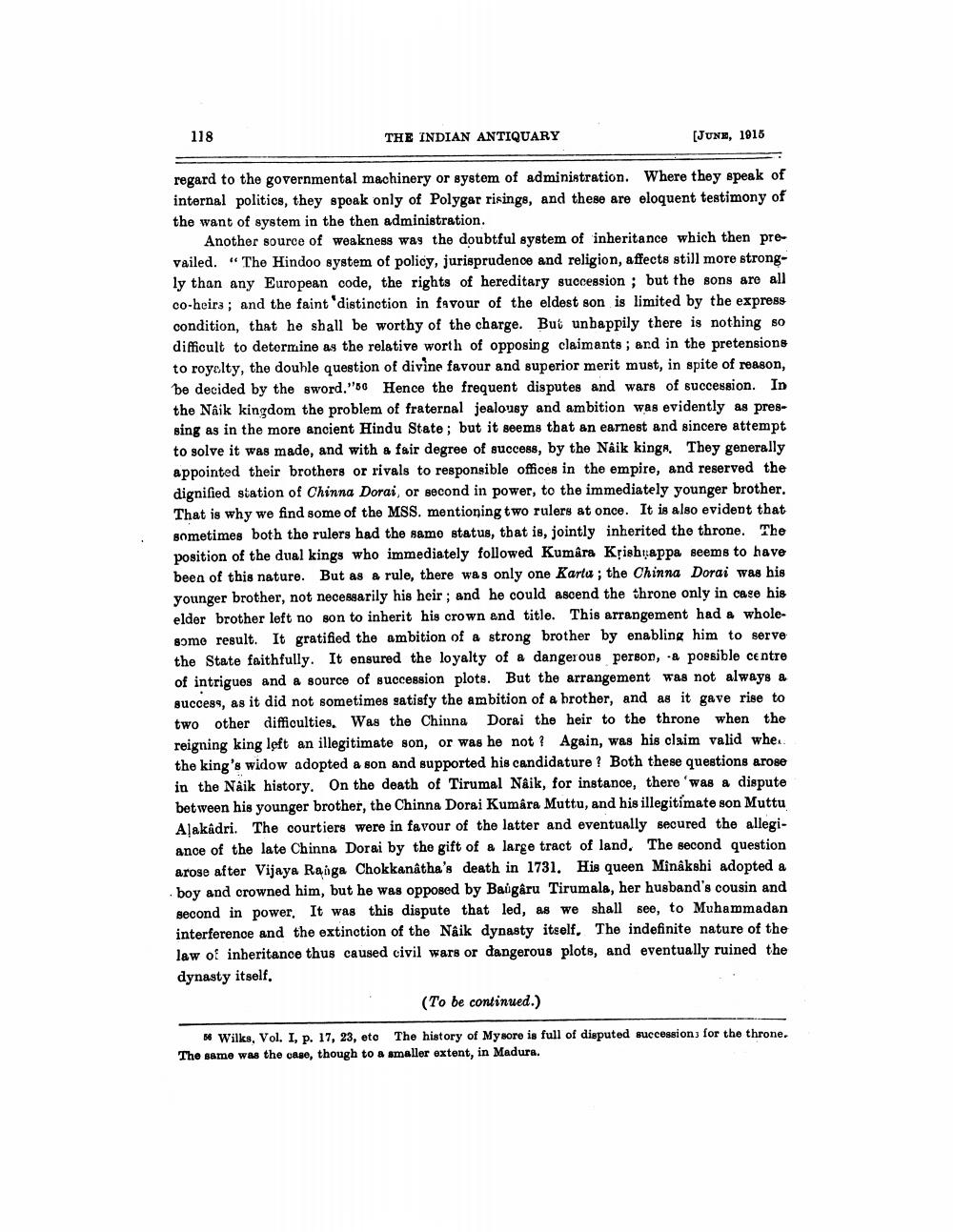________________
118
THE INDIAN ANTIQUARY
(JUNE, 1916
regard to the governmental machinery or system of administration. Where they speak of internal politics, they speak only of Polygar risings, and these are eloquent testimony of the want of system in the then administration.
Another source of weakness was the doubtful system of inheritance which then prevailed. "The Hindoo system of policy, jurisprudence and religion, affects still more strongly than any European code, the rights of hereditary succession ; but the sons are all co-heirs; and the faint distinction in favour of the eldest son is limited by the express condition, that he shall be worthy of the charge. But unbappily there is nothing so difficult to determine as the relative worth of opposing claimants; and in the pretensions to royalty, the double question of divine favour and superior merit must, in spite of reason, be decided by the sword."56 Hence the frequent disputes and wars of succession. In the Naik kingdom the problem of fraternal jealousy and ambition was evidently as pressing as in the more ancient Hindu State ; but it seems that an earnest and sincere attempt to solve it was made, and with a fair degree of success, by the Nâik kings. They generally appointed their brothers or rivals to responsible offices in the empire, and reserved the dignified station of Chinna Dorai, or second in power, to the immediately younger brother. That is why we find some of the MSS. mentioning two rulers at once. It is also evident that sometimes both the rulers had the same status, that is, jointly inherited the throne. The position of the dual kings who immediately followed Kumara Krishtappa seems to have been of this nature. But as a rule, there was only one Karta ; the Chinna Dorai was his younger brother, not necessarily his heir ; and he could ascend the throne only in case his elder brother left no son to inherit his crown and title. This arrangement had a wholesome result. It gratified the ambition of a strong brother by enabling him to serve the State faithfully. It ensured the loyalty of a dangerous person, & poesible centre of intrigues and a source of succession plots. But the arrangement was not always a success, as it did not sometimes gatisfy the ambition of a brother, and as it gave rise to two other difficulties. Was the Chinna Dorai the heir to the throne when the reigning king left an illegitimate son, or was he not? Again, was his claim valid when the king's widow adopted a son and supported his candidature ? Both these questions arose in the Naik history. On the death of Tirumal Naik, for instance, there 'was a dispute between his younger brother, the Chinna Dorai Kumara Muttu, and his illegitimate son Muttu Alakâdri. The courtiers were in favour of the latter and eventually secured the allegiance of the late Chinna Dorai by the gift of a large tract of land. The second question arose after Vijaya Ranga Chokkanátha's death in 1731. His queen Minâkshi adopted a boy and crowned him, but he was opposed by Baigâru Tirumala, her husband's cousin and second in power. It was this dispute that led, as we shall see, to Muhammadan interference and the extinction of the Nâik dynasty itself, The indefinite nature of the law of inheritance thus caused civil wars or dangerous plots, and eventually ruined the dynasty itself.
(To be continued.)
5 Wilks, Vol. I, p. 17, 23, etc The history of Mysore is full of disputed successions for the throne. The same was the ongo, though to a smaller extent, in Madura.




